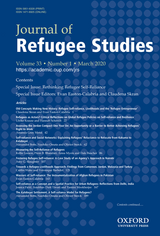
The asylum hump: why country income level predicts new asylum seekers, but not new refugees
Ruhe, Constantin / Charles Martin-Shields / Lisa Maria GroßExterne Publikationen (2020)
in: Journal of Refugee Studies 34 (2), 1730–1746
DOI: https://doi.org/10.1093/jrs/feaa007
Volltext/Document
Refugee response has become an important topic in economic-development policy, but the majority of macro-level analyses do not find an association between country income level and refugee numbers. We argue that the apparent lack of association stems from using the United Nations High Commission for Refugees’ count of refugees as the dependent variable in these analyses. Refugee counts reflect processes that take place in countries of arrival. In contrast, the decision to seek asylum may be more closely linked to conditions, including income, in countries of origin. Drawing on the ‘migration-hump’ concept from economic migration, we model counts of refugees and asylum seekers from conflict-affected countries for the same time period and find that differences in the level of gross domestic product (GDP) predict new asylum applications but not new refugee numbers. We outline reasons for this statistical finding, and discuss theoretical and practical consequences for our understanding of the relationship between country income and asylum-seeking.


